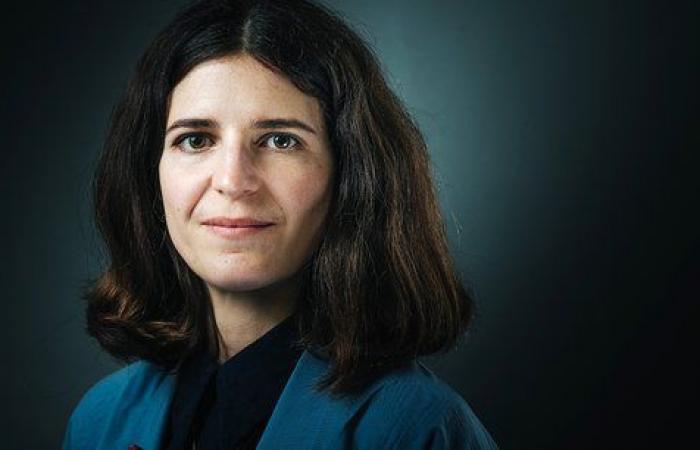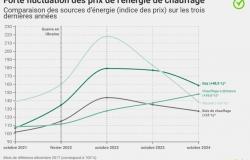
LA TRIBUNE SUNDAY — You are the very first secretary ofANDstatus of artificial intelligence in France. What message does the government want to send?
CLARA CHAPPAZ — This is a very strong signal because artificial intelligence is a technological breakthrough that poses enormous economic, political and societal challenges. Mastering AI is crucial for the sovereignty, competitiveness and attractiveness of France, and it is a vector of progress for all. In this context, highlighting AI in the title of a ministerial portfolio sends the message that the issues are understood to make France a major power in the sector.
“Using AI is a matter of life and death for a company” (Emilie Sidiqian, Salesforce)
Is it realistic to want to compete with the United States and China?
We are challengers. The Draghi report published in the fall provides a clear diagnosis of our strengths and our lead on many subjects, starting with talent. But he also says that we must unleash the potential of innovation if we do not want to fail.
This concern has been our driving force since the launch of the national AI strategy in 2018, which mobilizes 2.5 billion euros until 2025. This strategy has structured the AI ecosystem with actions across the entire spectrum. value chain, from infrastructure to major language models, including research.
Today, we have sovereign players in the cloud like Scaleway and OVHCloud, computing infrastructures with the Jean Zay supercomputer, large AI models that rival those of big tech with Mistral AI or H Company, a lot of start-ups -up AI in all strategic areas such as Aqemia in health, Preligens in defense… And of course globally recognized excellence in research. Now we have to amplify.
Last March, the report of the Interministerial Committee on AI asked theANDstate to invest an additional 5 billion euros per year for five years, essential to avoid a “historic downgrade”. Is this possible in this budgetary context?
The question of means is very important, but we must think about financing as a whole. In addition to the 2.5 billion euros from the national strategy and the France 2030 plan, we must also count on the private sector. And it plays its role, as shown for example by the launch last year of the Kyutai research center by Xavier Niel, Rodolphe Saadé [propriétaire de La Tribune, Ndlr] and former Google boss Eric Schmidt.
Kyutai is a philanthropic initiative which stimulates French research in AI and which has already resulted in significant progress with its vocal AI presented a few months ago. But there would be no Kyutai without the quality of public research and without talents who want to stay in France thanks to the attractiveness policy implemented since 2017.
Is Moshi, Kyutai's voice AI, pulling the rug out from under OpenAI?
There will be no extension? The report estimated that this investment would bring in an additional 240 billion euros in GDP in ten years…
The budgetary context is difficult, as everyone knows, and we must be responsible to control public finances. We must not forget that private financing, supported by the leverage of public money, is very important. AI also captured a large part of the funds raised by start-ups last year. Our mission is to ensure this continuum, therefore investing public money to lay the foundations of a dynamic ecosystem.
The report warned of the underfinancing of AI start-ups and called for the creation of a “France AI” fund of 10 billion euros to support companies like Mistral. What do you think?
Of course, the question of financing is key to preventing concentration in the hands of the American and Chinese giants. We are working on the subject in the run-up to the AI Action Summit, which France will host on February 10 and 11, 2025.
Building on the summits in the UK in 2023 and in Seoul last summer, we will welcome heads of state, businesses and civil society representatives from around the world to promote the idea of a third way in the United States and China.
“Investing in artificial intelligence means investing in growth” (Anne Bouverot and Philippe Aghion)
Concretely, what can we expect from this Summit?
Concrete means so that AI is synonymous with progress for all humanity and all countries, particularly in the South. There will be actions on the five pillars identified: AI in the public interest, the future of work, AI in culture, trusted AI and its governance at the global level.
We want this Summit to be as unifying as the Paris Olympic Games were, and to present an ambitious and positive vision of AI. The goal is to create a feeling of pride in what France has already accomplished thanks to its research and to champions like Mistral AI which is recognized throughout the world.
Exactly, isn't France too dependent on the success of Mistral? The company is set up as a standard bearer but it cannot compete financially with the American giants and could be an acquisition target.
Mistral proves that you can become a global player from France. But the country has hundreds of AI start-ups. Some are very promising like H, which raised $220 million upon its creation, or Aqemia which signed a $140 million partnership with Sanofi to discover cancer drugs using AI. Not to mention large groups and even champions of French Tech like Doctolib, who are transforming and improving their products thanks to AI.
Only 3% of VSEs and SMEs use generative AI. There is still a long way to go…
Support is crucial and takes place over time. The Internet did not transform businesses overnight. Work will be carried out to identify relevant use cases for AI. The more we can create high-performance AI products and services in France, the more attractive these technologies will be and will improve the competitiveness of businesses.
Since the challenge is to create a strong AI sector, why is your secretariatANDis tat placed under the supervision of the Ministry of Higher Education and Research, and no longer at Bercy or under the direct authority of the Prime Minister?
Because talent and research are the key to developing this ecosystem. The digital revolution has entered a new phase, that of deeptech, that is to say disruptive innovations coming from laboratories, which have enormous transformative potential.
This is valid for AI of course, but also for quantum or biotech. We have already created bridges between French Tech entrepreneurs and deeptech researchers, but the rapprochement with this ministry will allow us to amplify this movement. And we can always rely on the Bercy administrations on economic matters.
Precisely, you have access to the General Directorate of Enterprises (DGE) or the Interministerial Digital Directorate (DINUM), but without having political authority over them. This means that we will have to win arbitrations…
This is not a problem, the cooperation is going very well.
Many parliamentarians, including from parties in the government coalition, have proposed amendments aimed at cutting funding from the Research Tax Credit. What do you think?
The question of innovation support systems such as that of the CIR and the JEI is an important question for our entrepreneurial ecosystem and we discuss with all the players in the ecosystem to think about avenues for improvement, while respecting the line of budgetary responsibility driven by the Prime Minister.
What is the scope of your portfolio? Several subjects emerged compared to your predecessors, in particular digital infrastructures and digital inclusion subjects, which were entrusted to Catherine Vautrin, Minister of Partnership with the Territories and Decentralization.
There is no success in AI and digital without inclusion. We will therefore work together with Catherine Vautrin. Beyond steering action on AI across the entire chain, my scope includes the innovation ecosystem in the broad sense.
This includes the protection of the digital space for citizens, businesses and communities, for example the protection of children from the dangers of digital technology, cyberharassment, identity verification on the Internet, the aftermath of the Screens Commission launched by the President, or the digital issues around the mental health of young people, which is the great cause of Prime Minister Michel Barnier.
What about cybersecurity, when France must urgently transpose the European directive NIS2, which already came into force in October?
Cybersecurity is one of my priorities. There are countless cyberattacks on businesses and organizations, particularly hospitals, which cost victims 2 billion euros last year. This is a crucial subject. And this is why I will soon be introducing the bill transposing the NIS2 directive.
Comments collected by Sylvain Rolland





